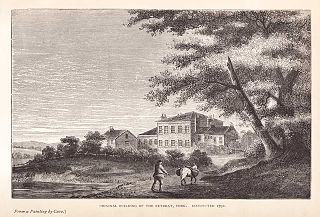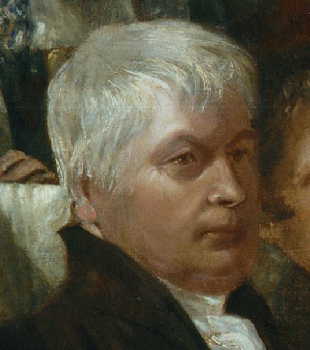Related Research Articles

Lieutenant-Colonel John Jacob Astor V, 1st Baron Astor of Hever, DL was an American-born English newspaper proprietor, politician, sportsman, and military officer. He was a member of the Astor family.

James Hack Tuke was an English philanthropist.

William Tuke, an English tradesman, philanthropist and Quaker, earned fame for promoting more humane custody and care for people with mental disorders, using what he called gentler methods that came to be known as moral treatment. He played a big part in founding The Retreat at Lamel Hill, York, for treating mental-health needs. He and his wife Esther Maud backed strict adherence to Quaker principles. He was an abolitionist, a patron of the Bible Society, and an opponent of the East India Company's inhumane practices.

Samuel Tuke was a Quaker philanthropist and mental-health reformer. He was born in York, England.
The Roosevelt family is an American political family from New York whose members have included two United States presidents, a First Lady, and various merchants, bankers, politicians, inventors, clergymen, artists, and socialites. The progeny of a mid-17th-century Dutch immigrant to New Amsterdam, many members of the family became nationally prominent in New York State and City politics and business and intermarried with prominent colonial families. Two distantly related branches of the family from Oyster Bay and Hyde Park, New York, rose to global political prominence with the presidencies of Theodore Roosevelt (1901–1909) and his fifth cousin Franklin D. Roosevelt (1933–1945), whose wife, First Lady Eleanor Roosevelt, was Theodore's niece. The Roosevelt family is one of four families to have produced two presidents of the United States by the same surname; the others were the Adams, Bush, and Harrison families.

Sir Thomas Fowell Buxton, 1st Baronet Buxton of Belfield and Runton, was an English Member of Parliament, brewer, abolitionist and social reformer. He married Hannah Gurney, whose sister became Elizabeth Fry, and became a great friend of her father Joseph Gurney and the extended Gurney family.

The Retreat, commonly known as the York Retreat, is a place in England for the treatment of people with mental health needs. Located in Lamel Hill in York, it operates as a not for profit charitable organisation.
The Tuke family of York were a family of Quaker innovators involved in establishing:

Samuel Gurney was an English banker and philanthropist from the Gurney family of Norwich. He should not be confused with his second son, Samuel (1816–1882), also described as banker and philanthropist, and a Member of Parliament.
Tuke may refer to:

Smith's Bank was a series of English banking partnerships in London and the provinces, all controlled by the Smith family that operated between 1658 and 1918. Although Smith's Bank was never a single entity, the first bank was established in Nottingham by Thomas Smith; often dated to 1658, it is believed to be the first bank to be formed outside London.
The Gurneys were an influential family of English Quakers, who had a major part in the development of Norwich, England. They established Gurney's Bank in 1770, which merged into Barclays Bank in 1896. They established successful breweries. A number of family members were abolitionists. Members of the family still live in the United Kingdom.
Edwin Fisher was an English banker, chairman of Barclay's Bank from 1936 until his death, and President of the British Bankers' Association
Sir Anthony Favill Tuke was chairman of Barclays Bank from 1973 to 1981 and Rio Tinto Zinc until 1985.
Sir William Macnamara Goodenough, 1st Baronet DL was a British banker. He served as the Chairman of Barclays Bank from 1947 to 1951.

Frederick Craufurd Goodenough, was a British banker. He was the chairman of Barclays Bank from 1917 to 1934.
Anthony William Tuke was an English banker. He was the chairman of Barclays Bank from 1951 to 1962.
William Favill Tuke was an English banker. He served as chairman of Barclays Bank from 1934 to 1936.
George Stacey Gibson FLS, was a British banker, botanist and philanthropist.
Samuel Denison Babcock was an American banker.
References
- ↑ Urquhart, A.R. . Dictionary of National Biography . Vol. 57. pp. 301–302.
- 1 2 "William Tuke (Chairman 1934-1936)". Barclays. Retrieved 7 August 2015.
- ↑ Alexandrina Buchanan (1997). A Guide to Archival Accessions at the Borthwick Institute, 1981-1996. Borthwick Publications. p. 150. ISBN 978-0-903857-74-1 . Retrieved 7 August 2015.